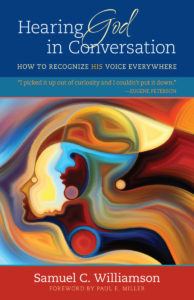My best friend in the world, from ages eight to eighteen (except for three long months), was Mark Maxam. Inseparable companions, we walked to school together, slept over on weekends, jumped off church roofs together, and shared every conceivable secret.

We also wrestled. One day, when I was ten, Mark put me in a scissor-lock that I couldn’t break. So, I bit him. He released me with the roar, “You bit me!” The blood-blush of mortification set my cheeks on fire as I bellowed back, “No I didn’t.”
The thing is: he knew I was lying, and I knew that he knew I was lying, and he knew that I knew that he knew that I was lying. The shame of my scarcely-veiled deceit (not to mention my little nibble) sent me on an emotional, self-protective tail-spin.
I left his house in a huff. I neither called him back nor visited.
Three months later, Mark stopped by my house and silently resumed our friendship. After a few days, I hesitantly asked why he never mentioned my biting. He answered,
“I realized friendship is more important than being right.”
Religion or Relationship?
Last week I read an article by a well-known author who claims that the “religion vs. relationship” tension creates a false choice. He emphasized, “And just for the record, the word ‘relationship’ nowhere appears in Scripture—at all.”
But “relationship” appears on every page of Scripture. When God describes his association with humanity, every single metaphor is relational:
- He is a shepherd and we are his sheep;
- He is a vine and we are his branches;
- He is our father, brother, friend, and bridegroom.
The pages of Scripture overflow with the images of a relational God, not mechanical religion. God even redefines “sin” when he declares it “adultery;” that sin is not breaking his rules nearly as much as it is breaking his heart.
Conversation
In one bizarre passage (if I can say that about God’s Word), Jesus vilifies relation-less Bible study. Addressing the Pharisees, Jesus says, “You search the Scriptures carefully because you suppose that in them you have eternal life. Yet they are about me. But you are not willing to come to me to have life” (John 5:39-40).
We can’t read Scripture without seeing a God who longs for relationship.
Every human heart longs for an intimate communication with God. We say there is a God-shaped vacuum in our being; but even after conversion, most believers still experience a vacuum of silence.
The lives of Christians ooze lifelessness to the world because we have adopted the world’s false solutions of busyness over relationship, mission over connection, activity over conversation. With God.
He hears us, yes, but he also wants us to hear him! He made us for a divine dialogue.
Two weeks ago, my friend Mark’s wife of thirty years died of bone cancer. When I asked him what he will miss most about Michelle, he said,
“I’m just going to miss talking with her.”
Sam
P. S. I recently wrote a book all about developing a conversational relationship with God. If you want to nurture that  divine dialogue with God, may I suggest you buy Hearing God in Conversation.
divine dialogue with God, may I suggest you buy Hearing God in Conversation.
Eugene Peterson said, “I picked it up out of curiosity, and I couldn’t put it down.”
Gary Wilkerson wrote, “This is a remarkable book that teaches both how to hear God’s voice in Scripture, and then to hear his voice in every avenue of life. It’s filled with humor, insight, practical tips, and sound theology. I can’t recommend a better guide than Hearing God in Conversation.

 I Wonder if Our Agendas Crucify the Life of God Within Us
I Wonder if Our Agendas Crucify the Life of God Within Us
Thanks Sam – another great, thought-provoking article! Among many things, I loved the idea that “sin is not breaking his rules nearly as much as it is breaking his heart”
I’ve been reading several of the prophets and the book of Judges; and I’m continually amazed that God would name our wronging to be “adultery” and “whoring after idols” and “unfaithfulness.”
His imagery shows not only the depth of our “tiny sins” but the depth of his heart for us.
No other god, no other religion, no other philosophy has a Lord like this.
Shortly after reading your most recent musings, my mind was wandering – thinking about my journey of pursuing a more two-way conversational relationship with Abba. And it occurs to me that one of the biggest stumbling blocks for me is (has been?) the belief (fear?) that other than a mutual love for each other, we have nothing in common. I mean, come on!, He is God and I am … well, me. How can two individuals who seem to have little in common, have a mutually satisfying conversation? It is only the previously mentioned mutual love for each other that has nudged me past my doubt, fear, dread — and changed my approach to conversing with Him. That, and the encouragement I receive from reading your blogs and the writing and/or sermons of a handful of other people who encourage us to relate to “God” as Abba. Now, I am just as likely to begin our conversations with, “Hey Abba! What’s up with you?” Turns out, most of the time it is not some new earth shattering revelation or instruction. He likes to “shoot the breeze” with me. And it ALWAYS brings life and lightness to my day. So thanks for encouraging me, Sam.
You’ve put your finger on two tough obstacles.
First, we say, “Uh, me? Really?” We tend to think God only speaks to the spiritual elite, Mother Theresa, St. Francis, Billy Graham. We fear we aren’t good enough. And the truth is, we aren’t! (And neither were they.) God doesn’t speak to us because of OUR goodness. He speaks to us because of HIS goodness, which is good enough for all of us.
And second, we think of “hearing God” for direction or revelation. Yet God walked and talked with Adam and Eve in the cool of the garden. Was he really telling them they should move to Timbuktu?
Or, rather, as you say, he simply likes to converse with his beloved. Us.
Thanks for sharing.
Sam